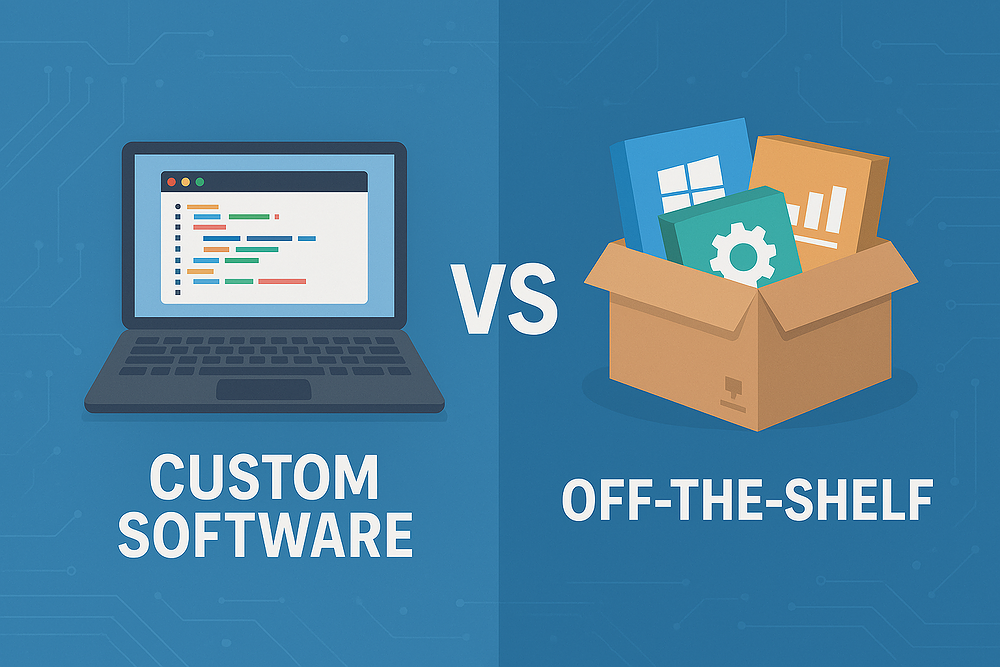Off-the-Shelf vs. Custom Software: Which is Best for Your Business?

In today's competitive business landscape, particularly within the UK market, technology choices can significantly influence a company's efficiency, profitability, and growth potential. One key decision facing many businesses is whether to opt for off-the-shelf software or to invest in custom-built software solutions.
Each option comes with its own distinct advantages and drawbacks, depending on your business's specific needs, size, sector, and growth ambitions. In this article, we'll explore both choices in-depth to help UK business owners make an informed decision.
Understanding Off-the-Shelf Software
Off-the-shelf software refers to pre-built, standardised applications designed for mass-market use. These solutions cater to a wide range of businesses with generalised features and functionalities. Popular examples include Microsoft Office, Salesforce CRM, and QuickBooks.
Advantages of Off-the-Shelf Software
- Cost-Effective: Because these solutions are developed for broad audiences, the development costs are spread out among numerous users. This typically makes them significantly more affordable upfront.
- Immediate Availability: Ready-to-use solutions mean you can implement and start utilising the software rapidly, minimising downtime and disruption.
- Regular Updates and Support: Providers regularly release updates, security patches, and new features. This ongoing support can reduce maintenance responsibilities for your business.
- Tested Reliability: These widely used systems have been extensively tested and reviewed, making them generally reliable and predictable.
Disadvantages of Off-the-Shelf Software
- Limited Flexibility: Off-the-shelf solutions are not easily customised to meet niche or specialised business processes. Businesses often find themselves adapting to the software rather than the software adapting to their needs.
- Scalability Constraints: As your business evolves, your requirements might outgrow standard software capabilities, potentially forcing costly migrations or integrations with additional systems.
- Excess Features: Often, businesses pay for extensive functionality they never actually use, which can complicate user experience and increase costs unnecessarily.
Exploring Custom Software Development
Custom software, on the other hand, is tailor-made specifically for your business, designed from the ground up to fit exact operational needs, business processes, and strategic goals.
Advantages of Custom Software Development
- Complete Customisation: With a bespoke software solution, every feature aligns precisely with your business's workflow and strategic objectives. This ensures maximum efficiency and productivity gains.
- Competitive Advantage: Custom solutions can provide functionalities that differentiate your business from competitors, giving you a unique market edge.
- Scalability and Flexibility: Custom software is designed to evolve alongside your business. You can easily adapt and scale the solution as your business grows or market conditions change.
- Ownership and Control: With custom-built solutions, your business owns the software outright, granting full control over data security, functionality, updates, and integration capabilities.
- Integration Efficiency: Custom software can be precisely designed to integrate seamlessly with existing systems, significantly improving workflow efficiency and data coherence across your business.
Disadvantages of Custom Software Development
- Higher Initial Cost: Custom software requires significant upfront investment, which can be a barrier for smaller businesses or those with limited budgets.
- Time to Develop: Developing bespoke software is inherently time-consuming. It may take weeks or months to fully develop, test, and implement, delaying benefits and potentially impacting operations.
- Maintenance Responsibility: Unlike off-the-shelf products, your business will typically bear the responsibility for ongoing maintenance, security updates, and improvements.
Which Option is Right for Your Business?
To determine the ideal solution for your business, consider the following key factors:
1. Budget Constraints
- If your budget is limited and your needs are fairly generic, off-the-shelf software might be the most practical choice.
- For businesses with specific, complex needs or those aiming for significant market differentiation, investing in custom software could offer superior long-term value despite higher initial costs.
2. Business Size and Complexity
- Smaller or simpler operations typically benefit more from standard solutions due to ease of use and lower costs.
- Larger, more complex organisations often find greater value in custom software, enabling intricate workflows and specialised processes.
3. Growth Ambitions
- Ambitious businesses looking to scale rapidly or enter new markets will likely benefit significantly from the scalability and adaptability of custom software.
- Companies with stable, predictable operational environments might prefer the straightforward efficiency of off-the-shelf solutions.
4. Sector Specific Needs
- Highly regulated or specialist industries (e.g., finance, healthcare, legal, manufacturing) typically require customised solutions to handle unique regulatory requirements and workflows.
- Generalised sectors like retail or standardised services might find off-the-shelf options more than adequate.
A Hybrid Approach
Increasingly, many UK businesses are adopting a hybrid model—integrating off-the-shelf software with custom-built enhancements or modules. This approach combines the best of both worlds:
- Rapid implementation and cost-effectiveness from off-the-shelf products.
- Enhanced capabilities and tailored functionality from custom-built integrations or modules.
For example, a business might use a standard CRM system but commission a custom-developed client portal, creating a more tailored customer experience.
Making an Informed Choice
Choosing between off-the-shelf and custom software ultimately hinges on a clear understanding of your business’s current challenges, future goals, and budgetary realities. Engage with trusted software providers and developers in the UK who can help assess your needs accurately and provide balanced recommendations based on your strategic objectives.
Conclusion
The software decision you make today can significantly impact your business’s competitiveness, productivity, and profitability for years to come. Off-the-shelf solutions provide affordability, reliability, and immediacy. Conversely, custom software delivers superior flexibility, precise alignment with business processes, and competitive differentiation.
Evaluating your company’s needs against these factors will ensure you choose a solution that best positions your business for sustainable growth and success within the dynamic UK marketplace.
Talk to us about your next project
Our team of experts is ready to help bring your ideas to life with solutions tailored to your business.
Get in Touch

